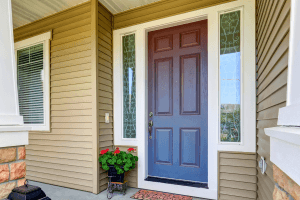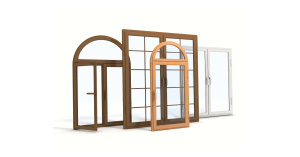One of the factors to consider when purchasing a new door is the material of the door. The most common options today include steel doors, wood doors, and fibreglass doors, all of which offer different types of aesthetic and different levels of energy efficiency, weather resistance, durability, and maintenance.
In some instances, the choice of door material is limited by the type of opening. Curved top entry doors, for instance, are almost always made from timber. Though you may also get a custom door made from any material you like. Here are the key differences between wood and steel doors:
Construction
Wood doors are typically constructed with a thin piece of laminate or plywood on either side and a thicker piece of hardboard behind it. An energy-efficient polyurethane material is used at the core to provide insulation. The panels are constructed with much thicker plywood and timber pieces.
Steel varies widely in quality and price, with higher numbers being representative of thinner steel. 24-gauge steel, for instance, is thin and easily deforms, and the paint chips off, causing rust. 22-gauge steel, on the other hand, is more suitable for the home market. It is thicker, stronger, and more durable. Lower numbers are commonly used for the commercial and security markets.
Weather resistance
Plywood and laminates are easily destroyed when exposed to the elements. As a result, wood doors require a lot of maintenance, which includes regular painting and/or staining to manage the fading. Also, plywood and laminate can only be refinished a minimum number of times if sanded. Moreover, the coverings will absorb moisture from inside, requiring regular maintenance.
Steel doors are the most energy efficient, with good insulating value, though they conduct heat. This means they can feel hot or cold to the touch.
Durability
Plywood and laminate doors are not as strong as solid wood doors that comprise 100 percent wood. These woods are the heaviest, most beautiful, and most secure doors on the market. They are constructed to be more durable than steel doors, but not as long lasting as fibreglass doors. They are also resistant to most shifting and expansion due to the elements, and can be sanded and refinished multiple times in their lifetime.Although steel doors require very little maintenance, they can be easily scratched and dented, requiring painting.
Cost
Solid wood is the most expensive door on the market. Steel doors are inexpensive compared to wood and fibreglass, low maintenance, secure, and available in a range of colours and styles, which makes them a popular choice for door replacements.
Verdict
Although you may be decided on buying a particular type of door, you should keep in mind that there are differences in quality that may enhance or diminish some of the typical characteristics of that door. For instance, high-quality steel doors can last as long as fibreglass doors. To ensure that you get the best quality of any door, it is important that you only work with reputable door manufacturers. A well-built steel door will definitely cost more than a poorly constructed version, so don’t compromise on the quality to fit your budget.

